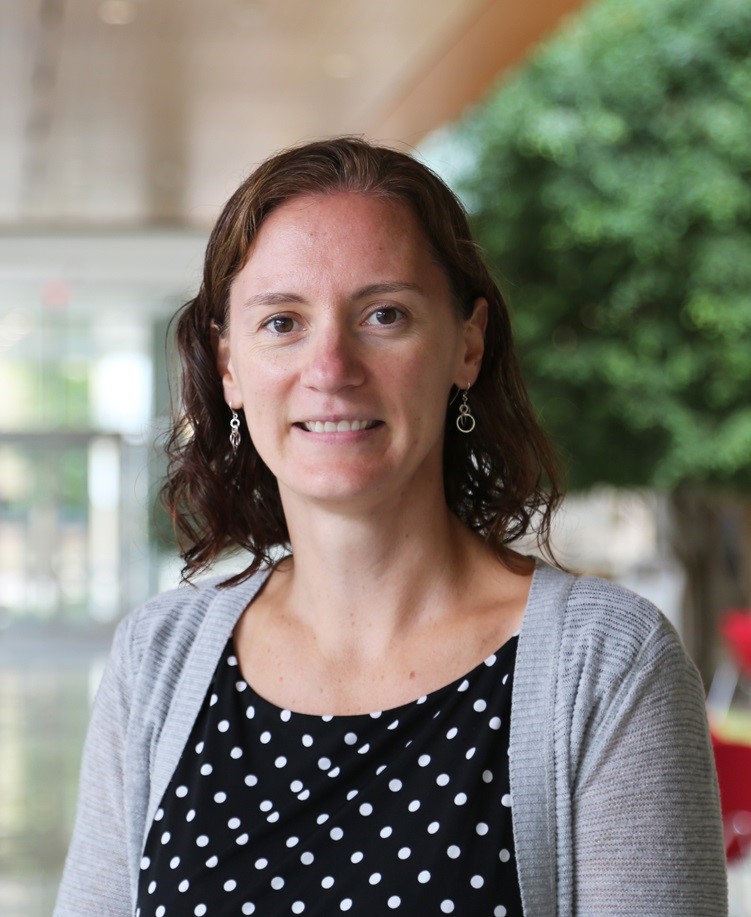Colloquia & Guest Speakers
Multiphoton autofluorescence imaging of immune cells in cancer
Melissa C. Skala
Morgridge Institute for Research Department of Biomedical Engineering, University of Wisconsin-Madison
Monday, November 30, 2020
3 p.m.–4 p.m.
Zoom Virtual Setting
Abstract:
Immune cells, including macrophages and T cells, have a range of cytotoxic and immune-modulating functions depending on activation state and subtype. However, current methods to assess immune cell function use exogenous labels that are limiting for time-course studies of immune cell behavior in tumors. Label-free optical imaging is an attractive solution. Here, we use multiphoton imaging of NAD(P)H and FAD, co-enzymes of metabolism, in T cells and macrophages within the tumor microenvironment. T cells were isolated from the peripheral blood of human donors, polarized to functional subsets, and subject to tumor-like media (low pH, low glucose, high lactic acid). Separately, human macrophages were co-cultured with patient-derived invasive breast cancer cells in a 3D microdevice to monitor metabolic changes with tumor-stimulated macrophage migration. NAD(P)H and FAD fluorescence intensity and lifetime were monitored on a single cell level in both systems using multiphoton microscopy. Significant differences in autofluorescence were observed between functional T cell subsets in tumor-like compared to standard media conditions, reflecting metabolic adaptations to the tumor microenvironment. Macrophages that actively migrated to the tumor cells in the 3D microfluidic model showed increased NAD(P)H/FAD intensity (optical redox ratio) compared to passively-migrating macrophages. Studies of in vivo T cell and macrophage metabolism using mouse models of cancer are underway. Altogether, these results indicate that multiphoton imaging of NAD(P)H and FAD is a powerful method for label-free, non-destructive monitoring of immune cell metabolism within single cells in the tumor microenvironment. These methods could inform new immunotherapy approaches for cancer.
 Biography
Biography
My lab has developed optical imaging technologies and quantitative analysis tools to study metabolic heterogeneity in cancer. Specifically, my lab developed optical metabolic imaging (OMI) to monitor single-cell metabolic dynamics within 3D patient-derived organotypic cultures (“tumor organoids”) and in vivo models. OMI uses two-photon fluorescence lifetime microscopy of metabolic co-enzymes NAD(P)H and FAD to quantify cell redox state and enzyme-binding activity. This approach is advantageous because fluorophores that are already present in the cells can be used to monitor metabolism with single cell resolution. Therefore, living primary human tumor organoids can be studied without transfection, and in vivo animal models can be monitored without artefacts from contrast agent delivery or washout. In parallel, my lab has developed image analysis tools and population density models to quantify cellular heterogeneity with tumor growth and treatment. These tools predict treatment response at early time-points in vivo and in patient-derived tumor organoids and monitor dynamic changes in cell subpopulations that are responsive and resistant to treatment. OMI has been used to unravel the features of cancer progression, drug response, and resistance to therapy. My expertise is specifically in cancer, metabolism, patient-derived tumor organoids, mouse models, multiphoton and fluorescence lifetime microscopy, and quantitative modeling of heterogeneity. My ongoing projects require active collaborations and mentorship of trainees from diverse backgrounds in microbiology, medicine, engineering, biochemistry, and biology.Biography
Positions and Honors
Positions and Employment
2002–2005 Predoctoral Fellow, Biomedical Engineering, University of Wisconsin, Madison, WI
(Advisor: Nimmi Ramanujam)
2005–2007 Predoctoral Fellow, Biomedical Engineering, Duke University, Durham, NC
(Advisor: Nimmi Ramanujam)
2007–2010 Postdoctoral Fellow, Biomedical Engineering, Duke University, Durham, NC
(Advisors: Joseph Izatt and Mark Dewhirst)
2010–2016 Assistant Professor, Biomedical Engineering, Vanderbilt University, Nashville, TN
2014–2016 Assistant Professor, Cancer Biology, Vanderbilt University Medical School, Nashville, TN
2016–2020 Associate Professor (with tenure), Biomedical Engineering (primary) & Medical Physics (secondary), University of Wisconsin, Madison
2016–pres Investigator, Morgridge Institute for Research, Madison, WI
2016–pres Member, University of Wisconsin Carbone Cancer Center (UWCCC)
2020–pres Professor, Biomedical Engineering (primary) & Medical Physics (secondary), University of Wisconsin, Madison
